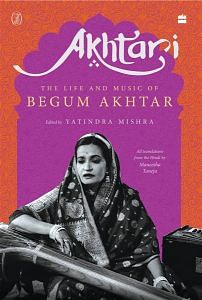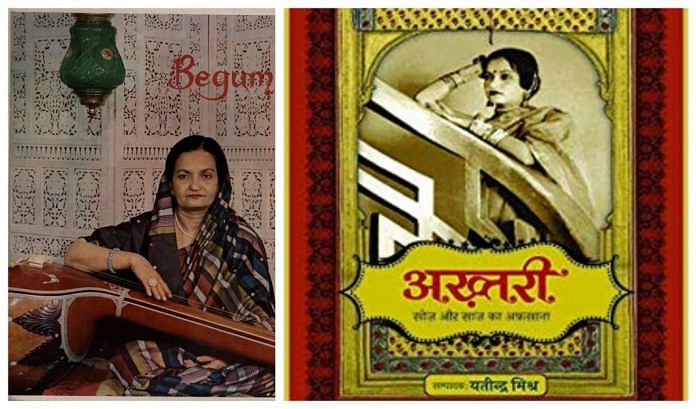It has been more than a hundred years since the birth of the empress of the voice that touched our soul, but she continues to enjoy unabated fame. That empress is none other than Begum Akhtar. Her maiden name was Akhtari Bai Faizabadi. Her singing is mentioned with admiration even today and will continue to be as long as there are music lovers in this world. But what is not discussed much, is Begum Akhtar’s parallel connection with cinema.
Begum Akhtar’s voice had begun reaching many people thanks to the gramophone records and theatre. Films were no longer mute. Calcutta was then the biggest centre for filmmaking. There was a serious hunt for people with a good voice. This was when the East India Film Company made an offer to Begum Akhtar to work in their films. Although her ustad, Ata Muhammad Khan, had warned her to either concentrate on singing or choose acting, Begum Akhtar stated balancing both to deal with a severe financial crunch.
Although not a stereotypical beauty, she had an extraordinarily attractive personality. Her voice was heavy and thick, but the poignant intoxication of her voice enthralled listeners. The East India Company wanted to take advantage of that very talent.
In 1933, the East India Company produced a film Ek Din Ka Badshah, directed by B.S. Rajhans. It starred Mazhar Khan, Akhtari Bai, Athar, Sabita Devi, Indubala, and A.R. Pahelwan. Lyrics by Shankar Shastri were set to music by Moti Babu and N.R.Bhattacharya. After having made a name for himself in Parsi Theatre, Fida Hussain ‘Narsi’ was working in movies and plays in Calcutta those days. He once said that in Ek Din Ka Badshah, Begum Akhtar had sung many songs but he remembered one especially because he was very fond of it. This song was ‘Woh aseer-e daaman balaa hun jisse chaen tak bhi na aa sakey’. According to Fida Hussain, this was Begum Akhtar’s very first movie.
Nal Damayanti was a 1933 film starring Mazhar Khan, Mukhtar Begum, K.C. Dey, Indubala, Narmada Shankar, and Begum Akhtar. Music director Master Nagai had prepared seventeen songs for the movie, and Begum Akhtar had sung many of those. But Fida Hussain only remembered a part of one song sung by her and the lyrics were ‘Jao jao na sataao apni raah lo main haari’ (Go, go away and carry on, don’t trouble me any more for I am now spent).
Roop Kumari, produced by Madan Theatres, was released in 1934. Begum Akhtar acted and sang in this movie. Another such film was Mumtaz Begum (1934) directed by Akhtar Nawaaz for the East India Film Company. In the same year, that is 1934, another of Begum Akhtar’s films was released. It was titled Ameena.
Jawaani ka Nasha, 1935, was an important movie in Begum Akhtar’s career. Madan Theatres, which was then working as Tollywood Studio, produced this film. Agha Jani Kashmiri, Master Khalil Ahmed, Miss Kansar Faizabadi were a part of this movie along with Begum Akhtar. Begum Akhtar had two songs in it. One was ‘Yaad mein teri jahaan ko bhoolta jaata hun main’ (I forget the world when I remember you), and the other was ‘Koyaliya mat kar pukaar karejwa laage kataar’ (Don’t call out to me, koel, for my heart bleeds) sung in the thumri form. According to Fida Hussain, ‘Koyaliya mat kar pukaar’ brought Begum Akhtar tremendous fame in the movie world. Set to music by Ramzan Khan, this song become very popular. With this song Begum Akhtar proved that she was adept at singing not only ghazals but also thumri and dadra. Many compositions in this style sung by her are popular even today.
Meanwhile, Begum Akhtar had realized that working in movies was not allowing her enough time to practise her singing, and the money too was not substantial enough to ignore other things. In fact, Jahanara Kajjan, Mushtari Begum, and some other singer-actresses were earning far more than Begum Akhtar. Neither did Begum Akhtar know how to glam herself up, nor was she interested. She could not forget Ustad Ata Muhammad’s warning about having to choose between being a singer or an actress.
Begum Akhtar then informed her mother of her decision to focus on singing, and therefore it was time to return. She bid adieu to films and went back to Lucknow. Once there, she got an opportunity to sing for the radio. It was there that she met Madan Mohan, who worked as a music director. It was this man who later gave the film world unforgettable melodies which are remembered even today. Through the radio, Begum Akhtar’s voice became a household presence.
In Mumbai, Mehboob was preparing to make Roti. He asked the music director and his good friend Anil Biswas to record a song for the movie in Sardar Akhtar’s voice. Anil Biswas said that though Sardar Akhtar had a good voice, she was not a professional singer. Mehboob angrily asked if he should get him Begum Akhtar to record a song. Anil Biswas replied, ‘Yes! If you can bring a singer like her, the movie will be beyond belief.’
Mehboob knew that Begum Akhtar had stopped working in films, but he was also an obstinate filmmaker. A week later he told Anil Biswas to get ready to record the songs because he had got Begum Akhtar to agree to work in the movie Roti.
In Roti, Begum Akhtar sang six songs as well as acted in it. She was paid Rs 25,000 for it. But what Begum Akhtar had to face during the making of Roti was demeaning for her. The hero of the movie was Sheikh Mukhtar. Apart from Chandra Mohan and Kanhaiyalal, Sitara Devi also worked in the movie.
It is said that, known for his misbehaviour with actresses and for being a tyrant on sets, Mehboob said something to Begum Akhtar that she found objectionable, and she protested. Mehboob could not tolerate any dissent. As a result, many of her scenes and songs sung by her were removed from the film. Two of her songs for the film – ‘Ulajh gaye nayanwa chhoote nahin chhutaaye’ (The eyes met and can’t avert the gaze now) and ‘Rehne laga hai dil mein andhera tere bagair’ (My heart is dark without you) – went on to become amongst the most popular ones of her oeuvre. With reference to songs being removed from the movie, film historian turned journalist Ruben quoted music director Anil Biswas saying that the problem was that the producer, National Studios, had a contract with HMV for records, but Begum Akhtar did not have a contract with HMV. Much after the movie’s release, Megaphone Company released music records of the songs sung by Begum Akhtar for Roti. Whatever the truth may be, this episode put Begum Akhtar off movies. She remembered her ustad’s words advising her to focus on one thing. After this, Begum Akhtar focused completely on her singing.
Many years later, under a lot of pressure from her friend Madan Mohan, Begum Akhtar sang for Dana Panee (1953) and Ehsan (1954) just one song, but she did not act. After this, Begum Akhtar firmly turned her back on moviedom. Despite knowing the fact that Begum Akhtar had not only given up acting but also singing for movies, Satyajit Ray nonetheless convinced her to work in his movie Jalsaghar (1958). Begum Akhtar was filmed singing a thumri in a music programme. The lyrics were ‘Bhar bhar aayin mori akhiyaan piya bin’ (My eyes welled up in the absence of my love). Jalsaghar was Begum Akhtar’s last released film.
 This excerpt from Akhtari: The Life and Music of Begum Akhtar has been published with special permission from Harper Collins.
This excerpt from Akhtari: The Life and Music of Begum Akhtar has been published with special permission from Harper Collins.



